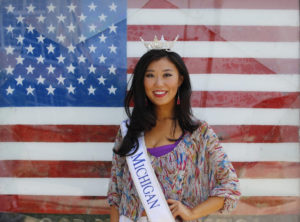
Five Asian American women competed in the Miss America Pageant (and scholarship program) last weekend, serving as examples of the growing diversity of the United States and continuing the redefinition of what constitutes the “all-American look” that the contest projects.
It’s telling how sensitive the Miss America organization to the question of diversity that when NBC News asked for statistics on pageant diversity to confirm the number of Asian American contestants, but representatives for the organization said they do not track this information. I guess it is better to not know that information than to confirm what many people of color suspect.
- Allison Carol Nanea Chu – Miss Hawaii. The 22-year-old graduate of the University of Hawaii-Manoa sang an operatic aria in the talent portion.
- Arrianna Quan – Miss Michigan. The Beijing-born Quan won the talent portion of the competition with her performance of Mily Balakirev’s transcription of Mikhail Glinka’s “L’Alouette (The Lark)” during the talent competition.
- Shruti Nagarajan – Miss Rhode Island. The Indian American student at Brown University did a Bollywood fusion dance, emulating the 2014 Miss America 2014 Nina Davuluri, the first Indian American to win the Miss America title.
- Justine Ker – Miss Louisiana. Ker, a first-generation Taiwanese American earned a Bachelor of Arts in neuroscience from Vanderbilt University. She’s been classically trained on piano for 17 years and classically trained on violin for 12 years. She made it into the Top 15 finalists.
- Jessa Carmack – Miss California. The Filipina American made it to the Top 15. The former 49ers cheerleader did a gymnastics routine for her performance – in front of Olympic champion Gabby Douglas, one of the judges of the contest.
The Miss America Pageant has long been criticized for its racist nature favoring Euro American contestants. In its early stages, the rules even stated that the winner should be of the “white race.” It wasn’t until Vanessa Williams won the 1983 title as the first African American Miss America was that glass ceiling shattered.
In 2014, Nina Davuluri was the first Indian American to be picked as America’s paragon of beauty.
Both Baraquio and Davuluri received hate mail when they were crowned Miss America.
In recent years, the pageant has come under fire for perpetuating sexist attitudes and has tried to change its image, by placing more emphasis on the talent portion of the competition and the scholarship awards given to the women at every stage of the competition.
As the standard of beauty changes, those who cling to the old Euro-centric appearance have become unnerved. When Quan was named Miss Michigan, she came under attack for being too “ugly.” What was curious was that the hate mail came from the Chinese community as well as from the expected sources.
“All this negativity came out,” Quan told People Magazine, “especially about my appearance and how I’m apparently unfit to represent the Chinese population because I’m ‘ugly.'”
She admits to being taken aback at some of the vitriol.
“But I’m OK now,” she added with a laugh. “I got over it,” she told the media.
The unbelievably poised Quan went on to say: “They just expressed their opinions, which is absolutely OK.”
The thing she found most upsetting about the debate over her appearance is not that people called her “ugly” — but that they were focusing on her looks above all else.
“I think I have some pretty important things to talk about, like getting people to vote, about this upcoming election, about diversity and immigration reform. Those are things I want to focus on during my year of service,’ she said. ‘Not about my appearance.
RELATED:
- Asian American women wrestle with body image
- Miss Universe wants to be more than a beauty queen
- Miss World contestant returns to Canada from China pageant
“You can think I’m ugly, and that’s fine, but I want to talk about things that are important too.
“I see it as a part of my job as a state title-holder,” the 23-year old Quan responded. “My goal is to just drive the conversation in an important direction, because there are so many things we have to discuss about immigration and diversity in this country right now.”
Before the competition last weekend, she told People magazine, “[Winning] would mean being able to represent a population of people in this country that are underrepresented right now: the immigrant population, the first-generation American population, Asian-Americans.
“I think it would mean exponentially more to them than it would to me.”
To underscore how the cultural perceptions and social expectations are so deeply ingrained, despite the racially mixed panel of celebrity judges, the newly-crowned Miss America and winner of the $50,000 scholarship and six-figure salary, is Miss Arkansas. She is … blond and blue-eyed Savvy Shields.
Let’s up on a positive note with this comment from Quan, who is a winner by most anybody’s standard: “It’s about taking really slow heavy steps. I think there is a lot to work on right now, …. It’s about taking very meaningful steps with intent.”
AsAmNews is an all-volunteer effort of dedicated staff and interns. You can show your support by liking our Facebook page at www.facebook.com/asamnews, following us on Twitter, sharing our stories, interning or joining our staff.




